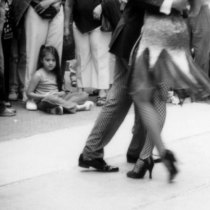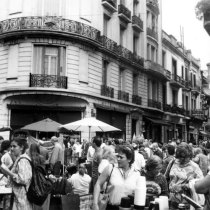Why do we (foreigners) flock to Buenos Aires? How does it pull us in, what does it represent to us that once we’ve had a taste of it, we keep going back for more? What lies at the heart of its allure to ever-increasing numbers of Americans and Europeans, sweet young thangs and retirees alike, people who go to start their lives, to change their lives, and to peacefully live them out? The economic argument has been made many times, and I think we all agree that the favorable cost of living to quality of life ratio is attractive. But this difference is becoming less profound with the years, and doesn’t explain why young people fresh out of school who haven’t had much of a chance to save up in dollars or euros still choose to test their luck scraping by on pesos.
I think Buenos Aires is a mecca of forbidden desires, of the dripping hot passion and decaying grandeur and utter unpredictability that is everything our culture is not. In the days before drug cartels, terrorism, and femicide, Americans used to cross the border into Mexico to briefly live another life, free of the inhibitions brought on by puritanism and sterile self-regulation. Places like Tijuana and the legendary “spring break” beaches still offer an alcohol-drenched, sexually promiscuous, hedonistic and delightfully exotic escape for tourists, but in my opinion, the playground of the elite has globalized along with the rest of the world. For the wine enthusiast, the non-conformist, the intellectual, the student, the artist, and the upwardly mobile, Argentina is a new type of escape, with Buenos Aires spinning at the center of this new dream. Cookie-cutter, middle-class suburban sprawl is fascinated by the chaotic enigma of this place. The tired office devotee sees an opportunity to reinvent herself and start her own business. The man who’s always played by the rules relishes the chance to live on the edge for once. The coddled university student grows up quickly in the constant consumption of experiences and thrill. And we all harbor a secret fantasy of getting swept off our feet by a dashing Latin lover, wild and slightly dangerous, unquestionably passionate, and excitingly mysterious.
Maybe volunteering to help the poor in the villas of Buenos Aires helps us forget that the U.S. has an abysmal record of poverty, failing schools, racial tensions, and with the current crisis, job loss. We feel more alive there, we feel like maybe for once we’re breaking out of the crowd, breaking out of the consumerist conformity we’ve been brought up to internalize. This isn’t too far off from the typical imperial and neo-imperial tourist narrative. The strange is fascinating because of how it lets us think about ourselves. We make comparisons that construct a positive image of ourselves and our culture – more rational, moral, better organized, and worldly. But Argentina is a particularly interesting case because this process of construction goes both ways. Argentines, many from European backgrounds, consider themselves a unique mix of European and Latin and don’t hesitate to negotiate identity in very similar ways. In other words, their relationship to foreigners in their country (Bolivians and Paraguayans as much as Americans) is far from passive, and that creates a far more complex dynamic than the typical civilized-primitive narrative, perhaps in fitting with a world when national borders matter less amidst flows of immigration and networks of information. I don’t claim any of this is a conscious choice. People who like to travel will always travel, but those who realize there’s something special about Buenos Aires are the ones who return. They spread the word, starting others’ journeys. The expat, long-term tourist and study abroad communities grow. A favorite old song sums it up pretty well…
Sweet dreams are made of this
Who am I to disagree?
Travel the world and the seven seas
Everybody’s looking for something
Some of them want to use you
Some of them want to get used by you
Some of them want to abuse you
Some of them want to be abused.
Who exactly does the using and abusing, and who gets used and abused, remains to be seen.





There is so much to what you say, in so many ways. Your writing “rocks” and there is so much wisdom in your words. I wonder if the variety of experiences you have had has given you a unique perspective – you seem to be able to both see and portray situations from many different angles, and many important ones. I so look forward to reading your future posts.